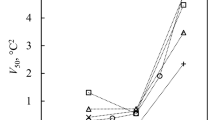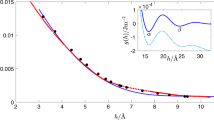Abstract
IT is widely known that the habit of ice crystals grown in air depends markedly on the temperature and excess of water vapour. This dependence was first studied by Nakaya and his collaborators and their results have been confirmed by many other investigators, but the problem of the factors determining habit remains unsolved.
This is a preview of subscription content, access via your institution
Access options
Subscribe to this journal
Receive 51 print issues and online access
$199.00 per year
only $3.90 per issue
Buy this article
- Purchase on Springer Link
- Instant access to full article PDF
Prices may be subject to local taxes which are calculated during checkout
Similar content being viewed by others
References
Marshall, J. S., and Langleben, M. P., J. Meteorology, 11, 104 (1954).
Shaw, D., and Mason, B. J., Phil. Mag., Ser. 7, 46, 249 (1955).
Kobayashi, T., J. Met. Soc. Japan., 75th Anniv. Vol. (1957).
Isono, K., J. Met. Soc. Japan, 75th Anniv. Vol., 31 (1957).
Isono, K., Komabayasi, M., and Ono, A., J. Met. Soc. Japan, Ser. 2, 35, 17 (1957).
Isono, K., Japanese J. Geophys. (in the press).
Author information
Authors and Affiliations
Rights and permissions
About this article
Cite this article
ISONO, K. Mode of Growth of Ice Crystals in Air and other Gases. Nature 182, 1221–1222 (1958). https://doi.org/10.1038/1821221a0
Issue Date:
DOI: https://doi.org/10.1038/1821221a0
This article is cited by
Comments
By submitting a comment you agree to abide by our Terms and Community Guidelines. If you find something abusive or that does not comply with our terms or guidelines please flag it as inappropriate.



